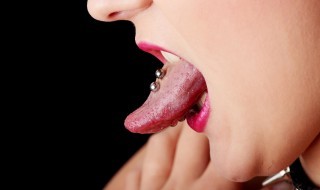
Research carried out by the Oral Health Foundation has found that, out of all oral piercings, tongue piercings top the chart.
When asked, ‘what kind of oral piercing do you have?’ 43% responded by specifying tongue. A third (33%) of people had a lip piercing, with cheek (3%) and gum (7%) piercings much less common.
The poll also found that 13% of people with oral piercings had more than one, highlighting the current popularity of the trend.
The charity wants everyone who has, or is considering getting, an oral piercing to understand the risks associated with them and take the necessary steps to avoid the health problems that they are related to.
CEO of the Oral Health Foundation, Dr Nigel Carter OBE, discussed the hazards that oral piercings can have on a person’s oral health. He said: ‘Our research has found that a sizeable amount of people are choosing to have oral piercings, they have become a very fashionable form of self-expression but not everybody realises the potential long- and short-term damages that they can have on our mouths.
‘Oral piercings are a major cause of chipped or cracked teeth due to trauma when they come into contact with the teeth; many people even have a habit of biting or playing with their piercing which can be extremely dangerous and can often lead to extensive dental work.
‘The mouth also contains a huge amount of bacteria and is an ideal place for infection to arise, this is especially the case with new piercings, as it is an open wound and needs constant care and attention to prevent infection. An infection can quickly lead to other more serious conditions such as blood poisoning (septicaemia).
‘The act of getting a piercing is itself very dangerous, as if done incorrectly can cause issues such as permanent numbness of the tongue, blood loss, excessive swelling which affects breathing and swallowing and in severe cases and increased risk of HIV and hepatitis B.’
The Oral Health Foundation is encouraging people to fully research the health risks associated with oral piercings and if they still wish to have it done ensure that they do so with a trustworthy provider and confirm that it is done in a clean and safe environment.
Dr Carter added: ‘On a day-to-day basis, oral piercings can interfere with such basic functions such as speech, chewing and swallowing, there is certainly a lot of things to think about before going out to get an oral piercing.
‘But, as our research shows, many people already have oral piercings. Our advice to these people is to keep it as clean as possible, using an antiseptic mouthwash regularly can help to do this. Try to avoid playing or fiddling with it and having it come into contact with teeth, especially when speaking or eating, as this leads to teeth wear that can lead to extensive dental intervention.
‘If you are taking part in sports, remove the jewellery to minimise the risk of any damage through trauma.
‘Most importantly though, ensure you visit your dentist regularly, as often as they recommend, to look after the overall health of your mouth and prevent any long term problems from developing.’


